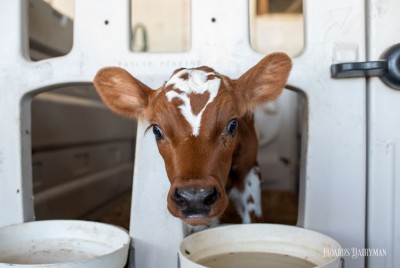Sick calves never reach their full potential by Carla Wardin
Alycia Drwencke, Dairy Management Specialist
Southwest New York Dairy, Livestock and Field Crops Program

Sick calves never reach their full potential
BY CARLA WARDIN, MICHIGAN DAIRY FARMER
"Calves are an investment in your future herd and profitability of your farm," said Margaret Quaassdorff, dairy management specialist with Cornell Cooperative Extension.
Early care is particularly important, since calves and replacement heifers account for 15% to 20% of milk production costs, which ranks third right after feed and labor costs, Quaassdorff reported in "Critical Calf Care," hosted by Cornell Cooperative Extension.
"We have to measure what we want to manage. But fortunately, there are a lot of factors in our control, and these are things we can keep accurate records on, apply economics to, and make decisions that are best for our calves and businesses," said Quaassdorff.
Record keeping, as well as later reviewing those records, allows farmers to use data to make economic decisions. Keep records for:
- Treatments
- Food and water intake, including the date feeding of milk is changed
- Growth, including birth weight and weaning weight to calculate growth
- Vaccinations
- Weaning
- Death and necropsy
"Most importantly . . . you don't need to reinvent the wheel and come up with these record keeping systems on your own. There are lots of software options available for you, or you can utilize some sort of Excel or paper version, or just pull from the internet and utilize the resources there," said Alycia Drwencke, a dairy management specialist with Cornell.
Economics play a large part in calf care, as illness has an impact on future performance. For instance, bovine respiratory disease, with pneumonia being the most common, typically occurs in the first 30 days.
"Calves that experienced pneumonia or bovine respiratory disease before 70 days weighed 12.7 pounds less than healthy calves at 90 days," Quaassdorff said. "These calves are also 2.8 times more likely to be culled before first calving, and 1.5 times more likely to be culled before 150 days in milk. When they were in the milking string, calves that had experienced a pneumonia event made 649 pounds less milk during that first lactation."
In addition, scouring calves treated with antibiotics gave 1,086 pounds less during their first lactation than those not treated.
"This can have a huge impact both on your calves' health and your bottom line," Quaassdorff said.
Overall, records can be a helpful management decision tool and also help give a clearer picture of what occurs on your farm.
"In addition, you can combine growth and health records with financial records to determine profitability and the economic efficiency of your calf program," Quaassdorff said.
Upcoming Events
Crops, Cows & Critters - Southwest New York Dairy, Livestock & Field Crops Newsletter Sponsorship
December 19, 2025
Our two forms of publications feature research-based and timely information from our four specialists, listed to the right, along with local event notifications and Cornell University outreach. This information is provided to participants who range from dairy, livestock, and field crops producers to agricultural suppliers and consultants.
Weekly Email Update: Shared with 625+ households who have signed up with our program.
Monthly Paper Mailer: To reach our stakeholders and farmers who lack internet access, we send out a monthly mailer where your company's logo and contact information would be featured with a mailing list of 330+ households.
If you sponsor our weekly and monthly publications you reach approximately 955 households.
Visit our website to view our newsletters!
2025 Cornell Food Beverage & Animal Feed Manufacturer Survey
December 19, 2025
Industry and Educational Advocates for New York State's Food, Beverage, and Animal Feed Manufacturing industries:
As you know, NYS has a diverse food and beverage manufacturing industry, in both the types of industries that exist and the wide distribution of firms by scale. Many manufacturing firms have strong backward linkages to agricultural production sectors in the state that support both farm-level and downstream food industry firms and consumers. In collaboration with the New York State Department of Agriculture and Markets, a team from Cornell University's Charles H. Dyson School of Applied Economics and Management has recently rolled out the 2025 New York State Food, Beverage, and Animal Feed Manufacturer Survey. The industry will benefit from an updated assessment of the industry that informs private and public investments and opportunities to support firm growth and improved profitability.
Cornell Organic Field Crops & Dairy Conference
March 6, 2026
Waterloo, NY
Farmers, researchers, educators, and agricultural service providers from across the Northeast are invited to the 2026 Cornell Organic Field Crops & Dairy Conference, held Friday, March 6, 2026, from 8:00 a.m. to 4:30 p.m. at the Lux Hotel & Conference Center in Waterloo, N.Y.
Co-hosted by New York Soil Health and Cornell CALS, the annual conference brings together leaders in organic grain, dairy, and livestock systems to share practical tools, new research, and farmer-tested strategies to support resilient and profitable organic production.
Announcements
No announcements at this time.





